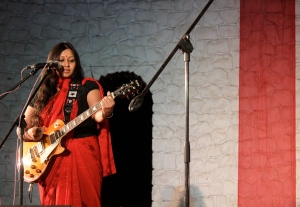Whither academic freedom?
VAKRATUNDA, MAHAKAYA… OR WHAT CANNOT BE SUNG IN THE UNIVERSITY?
Meera Visvanathan
is a former member of JNU students’ Union and a Ph D scholar at the
Centre for Historical Studies at Jawaharlal Nehru University.

Meera Visvanathan
Apoorvanand’s
article published online on Kafila had the courage to say in print
things that I, as a student of JNU, had so far only said in private.
Such acts of outspokenness are important for the conversations they set
up. They allow me to believe that the space of democracy is available,
at least intellectually, even as it retreats everywhere else.
I too stood
among the crowd at the Parthasarathy Rocks in JNU on the night of 1st
May as we waited to hear the Pakistani band Laal. Before Laal rose up to
sing, we were introduced to a young singer, Tritha, who was to sing
three compositions. The first two were clearly classically inspired,
but did not have a form that the audience could fit words to. As she
began the third composition, singing Vakratunda, Mahakaya……
in what was clearly a hymn to Ganapati, an uproar broke out among the
crowd. Tritha, however, continued to sing with her eyes closed. I
watched in horror as the President of the JNU Students’ Union (JNUSU)
walked on stage, the image magnified by the huge screen set up for the
audience, and asked Tritha to stop her song. The reasons for such an act
were not discussed. One must assume that a hymn to Ganapati was
considered ‘inappropriate’ for May Day Celebrations. On the big screen, I
watched the singer’s face fall as Laal took the stage to much applause.
Vakratunda,
Mahakaaya… I cannot remember what the rest of the hymn was because I
was not allowed to hear it. Somewhere, a few lines later, the
chant began Ganapati Ganapati… Based on my limited knowledge of
Sanskrit, Vakratunda, Mahakaaya translates as ‘of curved trunk, of
great body’. Just look at these epithets: can we imagine them being
used for any archetypal brahmanical God? Can they be used for Rama
smiling sweetly on Ramanand Sagar’s serial and presiding over the blood
of riots? As for ‘Ganapati’ which provoked such an uproar: the term
means ‘lord of a gana’ where gana is usually translated as a political
group, sometimes even a military one. The same etymology holds true for
‘Ganesha’. That is why, comrades on the left, even the General Secretary
of the CPI(Maoist) can go by the name Ganapathy and no one has got up
to ask him to change it.
Historians
will tell you that in origin, Ganapati was a yaksha, a tribal or folk
god of great powers. Over time, as brahmanical religion entered village
and tribal societies, he was absorbed into the Hindu pantheon. This
process was not unique: it occurred for any number of local cults,
images and themes across history. True, the figure of Ganapati himself
tells us little about the people of the past. But we cannot always reach
out to the ancient past with an ease that is possible for more recent
events. And even if narratives of appropriation are complex, they need
not take away from points of origin. To use a contemporary analogy: Does
the fact that Bhagat Singh is appropriated by the Hindu-right detract
from the fact that he was a Marxist? Does the mere image of Che Guevara
occurring on vodka bottles or mass produced on t-shirts allow us to
ignore his iconic status as a revolutionary? Cultural symbols are
usually more complex than the ways in which they are packaged and made
available to us.
What
happened in JNU on the night of May 1st was an act of unbelieveable
intolerance. It was marked by the peculiar combination of ignorance and
populism that drives censorship. But worse still, is the fact that such
intolerance is being justified in discussions subsequent to the event.
Clearly, people did not come to the concert expecting to hear a hymn to
Ganapati. But perhaps the situation could have been dealt with by
allowing the singer to finish her song and then taking the mike to offer
a critique? Surely we should be able to deal with ‘uncomfortable’
situations with some amount of political maturity and grace? Such an
action goes beyond the unhappiness it causes an individual artist or
member of the audience. It ties up to larger questions of how we view
our histories and what worth we assign to freedom of expression.
Of course,
we seem to have agreed that there are limits to the freedom of
expression. But surely these limits are meant to be ‘reasonable’. Would
singing a hymn to Ganapati on May Day have led to a carnage? Did it
amount to hate-speech? If not, why shut it up instead of dealing with it
in the terms of democratic debate? Small acts of silencing pave the way
for larger ones. If JNUSU can use its position of privilege to act so
summarily, then it erodes its moral authority to speak out against
censorship. Next time you raise your voice in support of M.F. Husain or
the struggling people of Kudankulam and Nonadanga, the chorus will be
muted because you too have shown your ability to suppress something that
isn’t ‘convenient’ for you. Next time you speak out against the moral
policing of the ABVP, your voice will be muted because you too once
abrogated to yourself the role of a ‘custodian of culture’. It is just
one step away from the idiocy that says ‘he break my nation, I break his
head.’
Stranger
still was the fact that night we were able to accept disco versions of
Pakistani poets we revere, but that tolerance died suddenly when faced
with a Sanskrit hymn. True, certain languages are used by political and
cultural elites to undertake acts of violence and bolster hierarchy. But
they are also often used to articulate a politics of dissent. English,
for instance, has been used to justify the worst possible racist and
imperialist excesses. But does that mean that we will cease to read
anything written in English? Most of the standardized bhasha languages
of today’s India grew and spread at the cost of local and tribal
languages. But does that mean we will exorcise them from our psyche? Nor
is the knowledge of Sanskit opposed in any way to a left-democratic
consciousness. D.D. Kosambi was one of the greatest Marxist minds of
India, and yet he spent years of his life studying, editing and
translating Sanskrit texts! To put it simply, it is not Sanskrit that
must be opposed. Rather, it is the people who use Sanskrit (or any
language, for that matter) to bolster caste hierarchies and brahmanical
patriarchy.
And in the
end, perhaps, what we need to reflect upon are the absences of our
cultural politics. To the fact that we have reduced ourselves to
canonizing certain texts and figures at the cost of others. To the fact
that our involvement in cultural politics is often no more than a blur
of slogan shouting. It shows not only an ignorance of history, but a
hollowness to our political selves.
Of late, the
university is a space where debates on censorship are becoming more
potent. We have seen how difficult it is to even raise the debate on the
removal of AFSPA or go through with a screening of Jashn-e-Azaadi. How
the most terrible forms of discrimination are experienced by Dalit
students, forcing them sometimes to commit suicide. How the legitimate
demand to be allowed to eat beef or pork on campus is meant by sexist
and casteist violence and abuse. But we of the left, progressive,
democratic, feminist, anti-caste spectrum cannot replicate such forms of
silencing, on however small or big a scale, because it takes away from
our larger struggles and demeans them.

An image of a painting of Ganesha by Meenakshi/ image: Prakash K Ray
I too
have been on occasion a member of the JNUSU Council so I know how
difficult it can be to take decisions on the spur of the moment. But
political decisions cannot and should not be based on the ‘mood’ of a
crowd. They have to be handled in terms of democratic reasoning and
civil debate. I would not expect a union that has known the
inconvenience of speaking truth to power, that was forcibly shut down
for three years in the name of the Lyngdoh Committee Recommendations to
suddenly abrogate to itself the privilege of deciding which voices can
be heard and which cannot, which songs can be sung and which cannot.
But it is
not JNUSU that is at fault so much as the larger university community. I
do not expect such acts of silencing from a university, particularly
not from JNU.


Comments